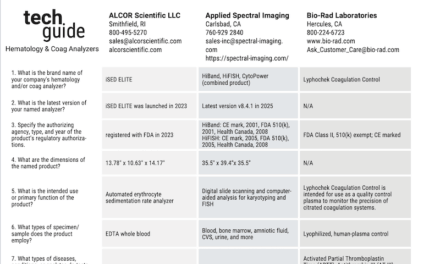Augurex Life Sciences Corp, Vancouver, has announced an extensive series of presentations related to its tests for 14-3-3 eta, a protein measured in blood, and the clinical utility of the protein for the diagnosis and management of rheumatoid arthritis (RA). The company and its clinical collaborators will present 10 studies at the annual meeting of the American College of Rheumatology (ACR) in Boston, November 14–19.
The company’s presentations build on recently published studies coauthored by leading international rheumatologists describing the 14-3-3 eta protein as a “mechanistic” biomarker involved in driving disease processes that lead to joint destruction. A simple blood test measures the levels of circulating 14-3-3 eta protein, assisting with early RA patient diagnosis and also assessing the likelihood of aggressive disease. Early diagnosis and treatment are known to lead to better clinical outcomes of this otherwise debilitating disease.
“What we are seeing, consistently, in the data, is that RA patients who have higher levels of the protein tend towards more joint damage progression over time,” says Anthony Marotta, PhD, chief scientific officer at Augurex. “Alongside the specialist’s clinical assessment, this provides ‘biological-level’ information regarding the disease mechanism at play, to assist with ongoing patient management.”
“This information is important to know,” says Yoshiya Tanaka, MD, PhD, professor and chairman of the first department of internal medicine in the School of Medicine at the University of Occupational and Environmental Health, Kitaky?sh?, Japan. “Rheumatoid arthritis is a multifactorial disease, and it has been published that 14-3-3 eta upregulates several factors that perpetuate disease. Furthermore, there are many drugs to choose from for treatment, but response to therapy is heterogeneous and depends on the disease mechanisms at play in a particular patient,” he explains.
Tanaka is principal investigator for one of the Augurex studies, which will be presented at ACR as a late-breaking poster presentation (poster L18). “Previous studies have shown that blood levels of 14-3-3 eta change along the disease course and inform treatment response,” he adds. “The study that we’ll present at ACR describes new findings in this area.”
The following sessions related to 14-3-3 eta testing and rheumatoid arthritis will be presented at the 2014 ACR conference, November 14–19, at the Boston Convention and Exhibition Center:
- 14-3-3 eta CIT:ARG antibody ratios: Are we overlooking the prognostic utility of citrullinated antibodies by only looking at titers? (poster 359; November 16, 9:00–11:00); Presenter: Dirkjan van Schaardenburg, MD; Jan van Breeman Institute, Amsterdam
- 88% of recent onset polyarthritis patients are positive for 14-3-3 eta markers and 14-3-3 eta autoantibodies inform a favorable prognosis (poster 360; November 16, 9:00–11:00); Presenter: Gilles Boire, MD, University of Sherbrooke
- Citrullinated 14-3-3 eta antibodies are specific for early and established RA and are complementary to ACPA (poster 361; November 16, 9:00–11:00); Presenter: Anthony Marotta, PhD; Augurex Life Sciences
- 14-3-3 eta early RA biomarkers: Does seronegative RA exist? (poster 362; November 16, 9:00–11:00); Presenter: Dirkjan van Schaardenburg
- 14-3-3 eta: A mechanistic biomarker that supports the concept of “uncoupling” of inflammation and joint damage (poster 405; November 16, 9:00–11:00); Presenter: Dirkjan van Schaardenburg
- 14-3-3 eta autoantibody positivity informs better clinical outcomes in RA (poster 408; November 16, 9:00–11:00); Presenter: Dirkjan van Schaardenburg
- Change in 14-3-3 eta expression in early RA patients treated with DMARDS corresponds with change in DAS28 and good EULAR responses (podium presentation 1903; November 17, 4:45–5:00); Presenter: Dirkjan van Schaardenburg
- Profiling 14-3-3 eta in human primary cell based BioMap disease models reveals a unique proinflammatory phenotypic signature consistent with RA-inflammation biology (poster 1975; November 18, 9:00–11:00); Presenter: Alison O’Mahony, PhD, BioSeek, a div. of DiscoveRx Corp
- 14-3-3 eta informs joint pathological mechanisms of treatment response to assist with T2T strategies (poster L18; November 18, 9:00–11:00); Presenter: Shintaro Hirata, MD, University of Occupational and Environmental Health, Kitaky?sh?, Japan
- Autoantibodies to 14-3-3 eta are novel biomarkers associated with inflammation and radiographic progression in ankylosing spondylitis (podium presentation 2985; November 19, 9:30–9:45); Presenter: Walter Maksymowych, MD, University of Alberta
Blood tests for 14-3-3 eta measure different forms of the protein and their specific autoantibodies. The first test in the 14-3-3 eta family measures concentrations of the whole protein. That test is CE marked for use in Europe, approved by Health Canada as an RA diagnostic, and available in the United States from Quest Diagnostics, as part of its lab-developed rheumatoid arthritis diagnostic panel, IdentRA, through a licensing agreement with Augurex Life Sciences.
For further information visit Augurex Life Sciences.







